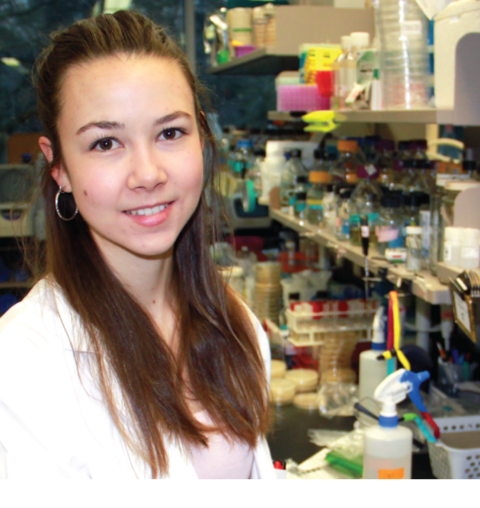Issue 8 - December 8th, 2017
|
| |
| | |
CMCB Facility Highlight: Genevac HT Series 3
The Genevac is a centrifugal evaporator and sample concentrator. It can be used to evaporate small volumes of solvent. Most solvents can be evaporated, except strong mineral acids such as Hydrochloric acid (HCl) and Hydrobromic acid (HBr) at any concentration. The latest Series 3 HT evaporator incorporates a new high performance vacuum pump and touchscreen technology, allowing even the most complex multi-stage evaporation methods to run quickly and easily. This technology is useful to many applications including post purification sample handling, metabolism & toxicology studies and natural products research.
Key Features: - High throughput evaporation
- High speed evaporation
- Fast lyophilisation capability
- Touchscreen control
- Integrated condenser
- Front opening for easy access
- DriPure anti-bumping
|
| One Health - People, Animals, and the Environment - Dr. Martha Fulford and Dr. Andrew Pawlowski
According to the Centers for Disease Control and Prevention, 6 out of every 10 infectious diseases in humans are spread from animals. At this month's ID/IIDR Combined Joint Rounds, Dr. Martha Fulford and Dr. Andrew Pawlowski discuss their unique areas of research in regards to One Health - a concept that recognizes the interrelationship between the health of people, animals, and the environment.
|
| RiboFACSeq: A New Method for Investigating Metabolic and Transport Pathways in Bacterial Cells
In recent years, we have seen tremendous advancements in numerous areas of research, owing in large part to the advent of modern high-throughput technologies. However, certain research fields, such as gene function discovery, still employ conventional/traditional techniques, which often lack throughput, sensitivity and/or specificity. As a solution to these problems, Dr. Yingfu Li's lab have proposed a new method for discovering the metabolic and transport pathways of a metabolite-of-interest in living bacterial cells by combining the use of a RNA-based sensor (i.e. a riboswitch sensor) that is responsive to the target metabolite, fluorescence-activated cell sorting (FACS) and high-throughput sequencing. As a proof of principle, the team successfully demonstrated the efficacy of their approach by targeting the genes involved in the transport and biosynthesis of vitamin B12 - a particularly difficult pathway to study as the molecules involved are produced in trace-quantities. Overall, the team's approach can be broadly employed in the study of metabolic pathways, and enhance the rate and accuracy of gene function discovery.
|
|  |
Transformation of the Anticancer Drug Doxorubicin in the Human Gut Microbiome
Although dozens of drugs are known to be metabolized by the human gut microbiome, the influence of bacterial metabolism on drug efficacy is only beginning to be understood. In a recent study involving Dr's MacNeil, Surette, Wright, and past and current IIDR trainees, a collection of gut isolates were screened for their ability to inactivate the widely used antineoplastic drug doxorubicin, identifying a strain of Raoultella planticola. This strain was identified as a potent inactivator under anaerobic conditions, using a novel mechanism of degradation dependent on molybdopterin-dependent enzyme(s). Degradation of doxorubicin by R. planticola was found to reduce toxicity of the drug to the model species Caenorhabditis elegans, providing a model to begin understanding the role of doxorubicin metabolism by microbes in the human gut. Understanding the in vivo metabolism of important therapeutics like doxorubicin by the gut microbiome has the potential to guide clinical dosing to maximize therapeutic benefit while limiting undesirable side effects.
|
| Interview with Visiting Faculty, Dr. Blaine Pfeifer
This week, we had a chance to interview Dr. Blaine Pfeifer, a visiting faculty to the McMaster IIDR from the University at Buffalo. Dr. Pfeifer is a professor within UB's Department of Chemical and Biological Engineering and School of Engineering and Applied Sciences. Read more about Dr. Pfeifer's area or interest, work within Dr. Eric Brown's lab, and plan's for the future.
|
|
| | | Call for Research Participants
The Bowdish lab is looking for young (30-70) and older (70+) adults to participate in a research study. If you or an older adult in your life might be interested in participating, click here for more details or contact Dr. Bowdish (bowdish@mcmaster.ca).
|
| ! Planning for the next IIDR Trainee Day is underway! If you or someone you know is interested in being an IIDR Trainee Day 2018 Ambassador, please contact Christy at grovec3@mcmaster.ca to sign up to our mailing list.
! The January ID/IIDR Combined Joint Rounds will take place on Monday, January 10th in MUMC HSC 4E20, and are open to all IIDR members and trainees. |
| | | ! Friday, December 15th: The IIDR Holiday Party
8:00 pm
The Collins Brewhouse 33 King Street West Dundas, ON L9H 1T5
Tickets are $10 and can be purchased in the IIDR Main Office - MDCL 2301. |
|
|
| Thursday & Friday, December 14th - 15th: Data Carpentry Workshop Aimed at teaching biology and biomedical researchers the data management basics they need to make their data curation and analysis skills more efficient and reproducible.
9:00 am - 5:00 pm
Hamilton Hall, Room 102
|
|
|
| Have Something Exciting to Share?
|
| | Send me your story at grovec3@mcmaster.ca.
|
| |
|
|